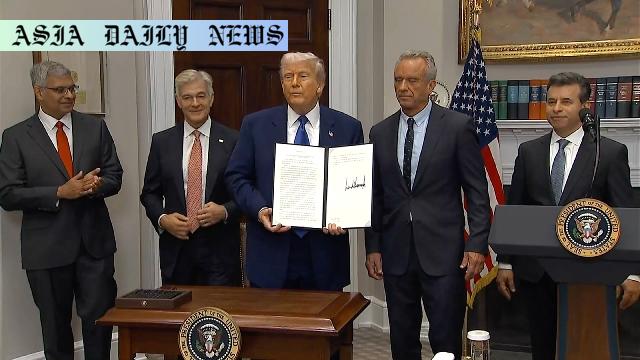Prescription Drug Prices – US President Donald Trump signs an executive order calling for reduced drug prices in the country.
Trump signed an executive order tackling prescription drug costs in the US.
The order demands price reductions from pharmaceutical companies.
Trump emphasized achieving the lowest medication costs globally.
Tariffs may be leveraged against nations failing to ensure fair prices.

Introduction to Prescription Drug Prices Reform
In a significant move targeting a long-standing issue, US President Donald Trump signed an executive order aimed at reducing the high cost of prescription drugs in the United States. The move has drawn attention nationwide, with millions of Americans pinning hopes on this groundbreaking measure. With the executive order in place, pharmaceutical companies face increasing pressure to align drug prices in the United States with those in other developed countries. For many, this signifies a step forward in making essential medications affordable to all.
The Highlights of the Executive Order
The executive order signed by President Trump includes several key action points. It mandates the Secretary of Commerce and the United States Trade Representative to take necessary steps to negotiate and enforce price reductions. Within 30 days of its signing, relevant officials are required to communicate ‘most-favored-nation’ pricing benchmarks to pharmaceutical manufacturers. This strategy seeks to end the disparity in drug pricing between the US and other comparably developed nations. Trump emphasized that Americans will no longer tolerate profiteering and inflated prices from the pharmaceutical industry.
Reasons Behind the Surge in Drug Prices
One of the main drivers behind this initiative stems from glaring price disparities. As Trump pointed out, American consumers often pay up to ten times the prices paid in other nations for the same medications. Countries in the European Union and elsewhere have implemented stringent measures to keep drug prices low, exerting pressure on pharmaceutical manufacturers to offer subsidized rates. Conversely, the US, often burdened with an unregulated pricing model, has provided pharmaceutical companies the freedom to set prices disproportionately high. Trump’s message to the pharmaceutical giants is clear: this imbalance must end.
Trump’s Vision and Impact on the American Public
Trump’s commitment to addressing the issue underscores the urgency of the matter. Referring to the action as ‘earth-shattering,’ Trump assured the American people that his administration is taking decisive and unprecedented steps to end what he has termed as ‘profiteering’ by pharmaceutical companies. This executive order has also drawn attention to potential punitive measures, including tariffs on countries that fail to ensure equitable pricing. Trump’s rhetoric reflects a sense of both accountability and strategic action to protect the interests of American patients.
Potential Challenges and Global Implications
Despite its ambitious goals, the executive order faces significant hurdles. Negotiating new pricing models with powerful pharmaceutical companies is bound to be a complex and lengthy process. Furthermore, the potential use of tariffs could trigger unintended trade disputes with global partners, particularly the European Union, which Trump identified as especially challenging. For the plan to succeed, coordination across government agencies, global cooperation, and public buy-in will be crucial. Nevertheless, this initiative represents a pivotal moment in the campaign to make healthcare affordable for all Americans.
Conclusion
The signing of this executive order by President Trump reflects an assertive approach to tackling one of America’s most pressing healthcare issues. While the challenges ahead are undeniable, the potential benefits for millions of Americans are equally significant. By making prescription drugs more affordable, Trump’s vision addresses an essential facet of public welfare and economic fairness. If implemented successfully, this could mark the beginning of a broader healthcare reform that prioritizes the well-being of American citizens over the interests of profit-driven entities.
Commentary
Introduction
The executive order signed by President Trump targeting prescription drug prices is undoubtedly a significant step forward. High drug prices have long plagued the American healthcare system, preventing millions from accessing necessary medications. This initiative attempts to address an issue that has persisted for decades and could serve as a blueprint for further reforms in the future.
The Importance of Lowering Drug Prices
For anyone who has struggled to afford life-saving medications, the promise of lower prescription costs feels monumental. The disparity between drug prices in the United States and other developed nations has always been shocking. Trump’s assertion that some drugs cost ten times as much in the US highlights a problem that is both systemic and morally troubling. In a landscape where people often have to choose between healthcare and basic necessities, the need for reform cannot be overstated.
Challenges of Implementation
While this executive order provides hope, implementing it will be challenging. The pharmaceutical industry wields immense influence, not just in the US but globally. The negotiations required to enforce ‘most-favored-nation’ pricing will demand significant political will. Moreover, leveraging tariffs as a backup strategy might strain global trade partnerships, potentially leading to economic repercussions. Nonetheless, bold measures often require calculated risks, and this plan reflects a willingness to confront complexities head-on.
Conclusion
President Trump’s move to challenge skyrocketing drug prices represents a commendable effort to prioritize the welfare of the American people. While the road ahead is undoubtedly fraught with obstacles, the potential impact of such an initiative could be groundbreaking. Whether or not it achieves its ultimate goal, it has already succeeded in spotlighting an issue that urgently demands national and international attention.


